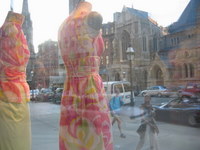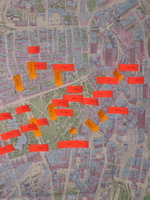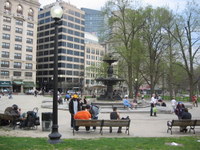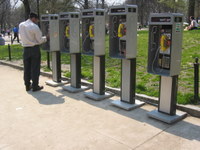On Itinerant
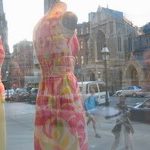
Teri Rueb describes Itinerant and quotes excerpts from the project's vocal track. The installation-style piece uses a GPS system and a headset. As the participant walks through the allotted space, the GPS cues various recordings. Rueb claims to want "to implicate the participant as a charged body in public space whose movement and presence become critical agents in structuring the meaning of the work."
bProject Summary
Itinerant invites people to take a walk through Boston Common and surrounding neighborhoods to experience an interactive sound work that reframes Mary Shelley’s Frankenstein, the classic tale of conflict between techno-scientific hubris and the human spirit. The project engages a search for an elusive character who is doppelgänger to both the doctor and the creature of the novel. Sounds, automatically “played” by visitors as they move through different parts of the city, create a series of frames within which to reflect upon our highly mobile, technologically saturated society and issues of identity, place, and displacement. The sonic overlay is also presented as an interactive map on the web, creating a reframing and displacement of this site-specific work.
Artist Statement
The installation is a site-specific responsive sound environment that weaves together and spatializes two texts: excerpts from Mary Shelley’s Frankenstein and an original text about an ambiguous character - the uncle - who is doppelgänger to both the doctor and the creature in Shelley’s novel. Shelley’s text is relayed in “quotes” as excerpted passages from a professional reading of Frankenstein. The second text, read by the author, has a more homespun quality. Spoken word passages and a counterpoint of footsteps and sounds that suggest the movement of an invisible figure play back automatically as the participant moves through the Boston Common and surrounding neighborhoods. The technical components of the system include a pair of headphones connected to a small pocket PC with a GPS and custom software (recently replaced with commercially available software). The participant’s movement, tracked by the GPS, triggers the playback of the sounds as she moves through parts of the city space where sounds have been “placed.” The active regions of the city space correspond to regions defined in the software. When the location of the participant intersects with one of these regions, the software automatically triggers playback of the appropriate sound file.
In creating Itinerant, my aim was to draw the participant into a spatialized narrative in a very specific way. I wanted to explicitly engage the participant’s physical movement, shifting perspective, and interaction with the surrounding environment as a primary force in creating tension in the work. The participant’s movement through the city physically generates the story as it triggers sound playback; however, I wanted to extend this action to implicate the participant as a charged body in public space whose movement and presence become critical agents in structuring the meaning of the work. The primary theme of alienation and the plight of the social outcast is played out through a series of physical tableaus and boundary crossings enacted by the participant as she walks through the urban landscape listening to a patchwork of location-specific spoken narratives delivered in different voices. My hope was to cast the participant into a cycle of alienation and ambivalence as the point of view in the story shifted across narrator, creature, doctor, and the character of the uncle. Through juxtaposing constantly shifting perspectives, both in the story and in the physical journey through the city, the participant might find herself caught between identification with and alienation from the various characters in the work and their reflection in the actual people she encounters along her journey, including herself. The observer’s own point of view as a walker in the city becomes conflated with the wandering characters whose voices fill her head as she walks.
Rather than a peaceful walk through the city accompanied by an entertaining or moody story, my aim was to use the highly charged aspect of the participant’s body in the system - both the interactive software system and the city as social system - to heighten the discordant tones or voices in the work. I wanted to call attention to the gaps between the texts and spaces of the city. I wanted to draw attention to the actual conditions of the urban environment and the participant’s place within it as a rather conspicuous character wandering in unusual ways through the city with a rather obvious piece of technology.
It was my hope that this dis-ease or displacement would mirror, in some way, the experience of the main characters/narrators as they shift from inside to outside positions in the narrative. In this way, each participant becomes an “actor” or “character” uniquely written into the narrative, but ever unable to fully enter it as in a traditional narrative or through “suspension of disbelief.” Furthermore, the participants exist as characters that are never fully knowable or accountable by the author, as in traditional texts. Yet this variable condition is heightened as the context in which the participant experiences the work constantly changes within a range of parameters determined only by the limitless space-time of the participant, the city, and her journey through it.
Practical Description
The installation is designed as a mostly open-plan composition with a designated beginning and end. Three general movements or “themed spaces” are implicitly articulated as “introduction/denouement” (Commonwealth Avenue and Newbury Street), “paradise/home” (the Public Garden), and “purgatory” (the open-plan spaces of endless wandering through the Boston Common and bordering neighborhoods).
A map directs the participant’s first movements through the Newbury Street shopping district to Commonwealth Avenue where the first spoken word passage begins. As Commonwealth Avenue opens on to the Public Garden, the wanderer typically moves through the garden, making their way to the remaining areas of the installation on the other side. The rest of the installation is spread through the entire downtown area and can be accessed via any number of exits from the Public Garden; none is dictated or assumed. The entire piece takes approximately two hours to fully experience at a relatively steady pace. It is intended, however, that participants will experience the work as a patchwork narrative that may or may not be navigated in its entirety. Return visits yield new configurations of the experience as the conditions of the city, the seasons, and the variable moments of reception bring new layers to the text.
Intro Passages
These intro passages start at the gallery and proceed along Commonwealth Avenue. This is explicitly marked on the map as the recommended route into the rest of the installation space, the remainder of which is meant to be explored in any order. However, as the space of the installation is indicated on the map and is physically constrained to produce certain transversals, these passages typically segue into the passages in the public garden (Juxtaposition #2).
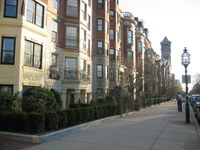
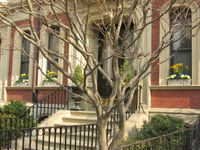 Rueb:
A dinner party, the table set - each plate a luminous circle of reflection, a bright face of hope and anticipation. Grandma and grandpa are coming, and maybe Uncle Kelley, though he comes as often and predictably as some rare comet of obscure origin, drifting in from what I always imagined as an exotic journey around the world. Egypt, Syria, the Far East … though it was usually Haiti. This man whose name I share was a wanderer, a face I knew only in hazy dim patches that float before my mind’s eye, flickering masses that inevitably resolve into the image of a young man, a framed high school portrait that sits on the dresser of my grandmother’s guest room.
Rueb:
A dinner party, the table set - each plate a luminous circle of reflection, a bright face of hope and anticipation. Grandma and grandpa are coming, and maybe Uncle Kelley, though he comes as often and predictably as some rare comet of obscure origin, drifting in from what I always imagined as an exotic journey around the world. Egypt, Syria, the Far East … though it was usually Haiti. This man whose name I share was a wanderer, a face I knew only in hazy dim patches that float before my mind’s eye, flickering masses that inevitably resolve into the image of a young man, a framed high school portrait that sits on the dresser of my grandmother’s guest room.
I see him now as he was at Christmas in 1972. I was four years old. I had never met this man before and though I didn’t know it then, I would never see him again at the holidays. He was on special leave from the hospital in Colorado Springs where my father had him committed. His phone calls to our home ignored, he had crossed a line and begun to make threatening phone calls to my father’s colleagues.
He sat low in the brown and gold striped armchair. His long legs cut a straight line deep into the nest of torn gift wrap and wriggling children, a nest of frenzied activity as the long-awaited moment finally arrived, setting five children scrambling to get their share. His lithium-laced gaze, unwavering, shot through the glow of the brood clamoring about the tree, resting on some distant horizon of disbelief - an engineer lost in infinity.
My grandparents, parents, uncles, and aunts hover tenuously at the vague periphery of this image. The moment thus circumscribed and suspended, hung in the delicate balance of domesticity and disaster. My mother sent silent signals that rippled invisibly through my sisters’ bodies, then mine. She sat at the center of a web spun of nature and nurture that registered even the subtlest tremor - the threat of inevitable rupture. Relentlessly we would mend the frayed fabric with carefully placed words and obedient gestures, knitting the family together again in a tangle of love and lies …
And now I find myself walking the streets of yet another new city, this one full of history, age, and affiliation. The brick facades and frozen sidewalks press against me as I pull myself along, wandering around residential neighborhoods: Back Bay, Beacon Hill, South End. The windows, their bright eyes gleaming, invite my furtive glance inside, inside the sepia-toned hazy glow that envelops the figures of a family. I catch myself staring, like Shelley’s Frankenstein, that pitiful creature who night after night peered in at the family through the window of their little cottage in the woods. Only I realize that I am actually on the inside, looking out - trying to find myself in the reflection of him on the outside, looking in. I am haunted by the memory of this life born into solitary existence, wandering the globe in search of a name, an identity through progeny - a creature living outside the rhythm of biological time.
Juxtaposition #2
The Public Garden
Shelley: Autumn passed thus. I saw, with surprise and grief, the leaves decay and fall, and nature again assume the barren and bleak appearance it had worn when I first beheld the woods and the lovely moon. Yet I did not heed the bleakness of the weather; I was better fitted by my conformation for the endurance of cold than heat. But my chief delights were the sight of the flowers, the birds, and all the gay apparel of summer; when those deserted me, I turned with more attention towards the cottagers. Their happiness was not decreased by the absence of summer. They loved and sympathized with one another; and their joys, depending on each other, were not interrupted by the casualties that took place around them. The more I saw of them, the greater became my desire to claim their protection and kindness; my heart yearned to be known and loved by these amiable creatures; to see their sweet looks directed towards me with affection was the utmost limit of my ambition. I dared not think that they would turn them from me with disdain and horror. The poor that stopped at their door were never driven away. I asked, it is true, for greater treasures than a little food or rest: I required kindness and sympathy; but I did not believe myself utterly unworthy of it.

 Rueb:
He finally returned to the tiny town of one thousand where he grew up. The streets, the band shell, the cinema now stand silent. I imagine him walking past the library, the town hall, the high school … all the places that once turned a cold shoulder to him, now took him back in without questions.
Rueb:
He finally returned to the tiny town of one thousand where he grew up. The streets, the band shell, the cinema now stand silent. I imagine him walking past the library, the town hall, the high school … all the places that once turned a cold shoulder to him, now took him back in without questions.
My grandparents, once unyielding toward him, silently accepted him into their home for as long as he would stay. He moved into the basement apartment where we always played house as children. During these years, he slipped silently in and out through the back door, living like an anonymous tenant in his own childhood home. The basement was clearly off-limits now, though I peeked in one time and saw the vintage 1950s décor, so familiar from my childhood, transformed now by the spoils of his travels - Egyptian hassocks, embroidered cushions and tapestries from the Middle East - one depicting robbers on horses stealing away with gems and bare-breasted virgins, a knife in a beaded sheath. He sold motorcycles assembled from kits in the basement. When my grandfather died, he expanded his enterprise to the lot that had been my grandmother’s garden, filling it with Volkswagen Beetles he rebuilt himself to re-sell. His inventory never moved during these years. The Volkswagens, itinerant beasts of another era, seemed happy to settle their worn wheels into the soft Kansas earth, and so did he.
The following sounds correspond to the area around the Park Street T stop.
Rueb: Even at the earliest age, I knew him only as a mute and invisible force, a dark specter representing a threat of immeasurable proportions, if only because my parents went to such great lengths to keep him out of our home. The sound of his name pronounced in countless foreign accents, emerging from the mouths of collect call operators around the globe, would slowly take form as the syllables of my own name. My mother always insisted it was simply coincidence. Upon hearing his name, my heart would beat sharply as I caught my breath and repeated “no” as instructed - “no,” “no,” “no.” My siblings and I repeated this dutiful execution of my father’s command all the years of our youth.
Answering the phone in our house was serious business. We were not allowed to perform this function until we had learned to write and had been properly trained to take thorough messages. It was grave trouble if we transposed a number or missed an important detail, and so, phone calls from my uncle required their own careful protocol just as any other. “Roberts Residence” … “May I please ask who’s calling?” “Crazy Joe,” he might say, if he was drunk or in a particularly sarcastic mood. My father would refuse his calls, almost without exception, but as a duty if my father was home the question always had to be asked, “Will you take the call?” Occasionally my mother would accept (usually after a vodka tonic or two) and we would eavesdrop eagerly to hear the news. Through fragments of a one-sided conversation, carried to us through my mother’s voice, we would strain to fill in the story of where he was, what countries he’d visited … and that he needed money, his inheritance held under my father’s name.
Shelley: How can I move thee? Will no entreaties cause thee to turn a favourable eye upon thy creature, who implores thy goodness and compassion? Believe me, Frankenstein, I was benevolent; my soul glowed with love and humanity; but am I not alone, miserably alone? You, my creator, abhor me; what hope can I gather from your fellow creatures, who owe me nothing? They spurn and hate me. The desert mountains and dreary glaciers are my refuge. I have wandered here many days; the caves of ice, which I only do not fear, are a dwelling to me, and the only one which man does not grudge. These bleak skies I hail, for they are kinder to me than your fellow beings. If the multitude of mankind knew of my existence, they would do as you do, and arm themselves for my destruction. Shall I not then hate them who abhor me? I will keep no terms with my enemies. I am miserable, and they shall share my wretchedness. Yet it is in your power to recompense me, and deliver them from an evil which it only remains for you to make so great, that not only you and your family, but thousands of others, shall be swallowed up in the whirlwinds of its rage. Let your compassion be moved, and do not disdain me. Listen to my tale; when you have heard that, abandon or commiserate me, as you shall judge that I deserve. But hear me. The guilty are allowed, by human laws, bloody as they are, to speak in their own defence before they are condemned. Listen to me, Frankenstein.
Cite this article
Rueb, Teri. "On Itinerant" Electronic Book Review, 28 March 2008, https://electronicbookreview.com/publications/on-itinerant/
